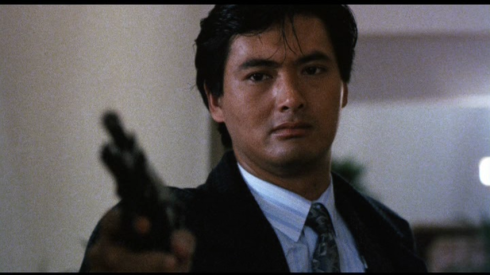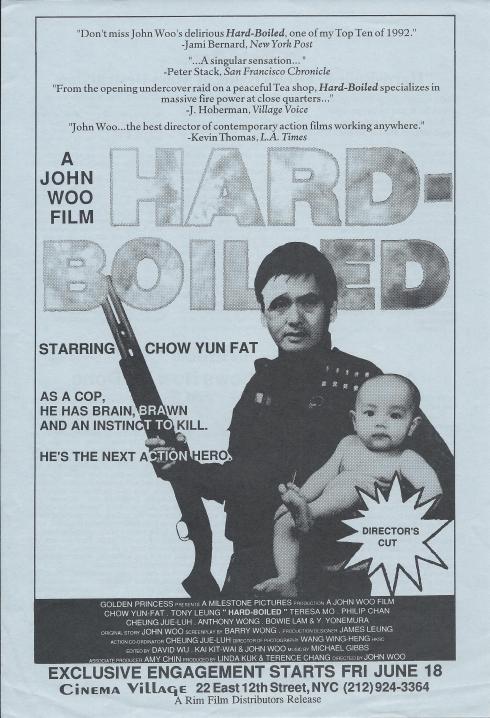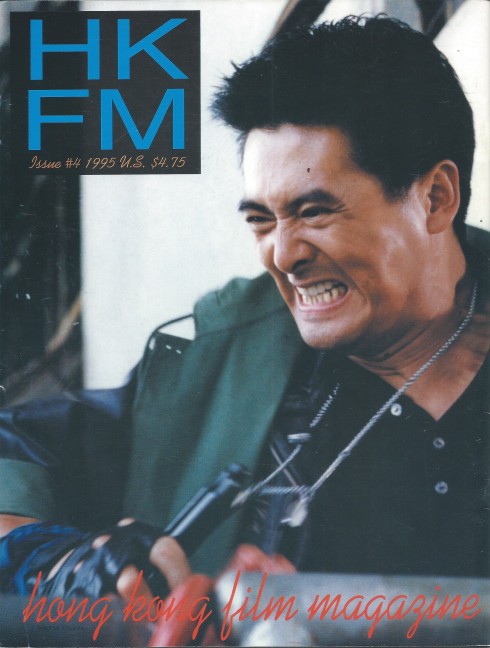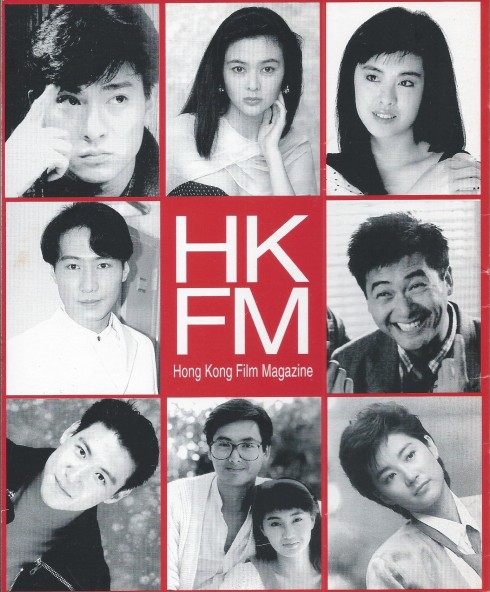On April 26, 1996, I visited a screening room in Manhattan to see PEACE HOTEL (1995), the last film Chow Yun-Fat made in Hong Kong in the 20th century. The screening was followed by a press conference with Mr. Chow, at a nearby venue, which I also attended. At the time, Chow was best-known in the U.S. for such John Woo-directed shootout-heavy action films as A BETTER TOMORROW, THE KILLER and HARD-BOILED and the Ringo Lam thrillers CITY ON FIRE and FULL CONTACT. He was in town to promote a retrospective series of his films at the Cinema Village Theater in Manhattan, programmed by Peter Chow, who had curated several series of Hong Kong films at the theater prior to this. Chow was being offered roles in Hollywood films and was in the process of choosing which project to commit to when the press conference was held.
I wrote up the event and pitched it to the magazine Entertainment Weekly in hopes of getting my foot in the door there as a freelance contributor covering the burgeoning popularity of Japanese animation and Hong Kong films in the U.S. I never got anywhere, since they relied on in-house staff writers for everything, but I still have a few short pieces I wrote and pitched during that time. Since the Chow Yun-Fat piece was never published and I recently discovered it languishing in a file, I thought I’d share it with my readers here, especially since it offers a snapshot of a time when Hong Kong movies were attracting attention in Hollywood and gaining wider acceptance in the U.S. beyond the niche audience that had initially embraced them.
I faxed the piece to Dave Karger at Entertainment Weekly on April 30, 1996. (Karger, of course, is now well-known to movie buffs as one of the on-camera hosts on Turner Classic Movies.) Here’s the pitch memo to Karger, followed by the complete piece:
Last Friday, a press conference was held for Chow Yun Fat, the Hong Kong movie star known for such John Woo movies as THE KILLER and HARD-BOILED. Chow is currently the subject of a retrospective at the Cinema Village and is eagerly looking for a film to do in America.
Following is a draft of a short piece based on the press conference and highlighting Chow’s attempt to devise a strategy to prepare his Hollywood debut. The actor’s move to L.A. follows the recent U.S. boxoffice success of his Hong Kong compatriots Woo and Jackie Chan.
In the text, I refer to the star as Chow (his family name) since he has never adopted an English name the way many of his peers have. I have used some quotes from the press conference, although they were hard to pick out since his English is still somewhat flawed.
I hope you can use this piece or a shorter version of it.
Chow Yun Fat, World’s Top Action Star, Follows John Woo and Jackie Chan to Hollywood
Sporting shades, slicked-back hair, a long black coat and a matchstick clenched between his teeth, Hong Kong star Chow Yun Fat was dubbed “the coolest actor in the world” after a series of high-octane crime pictures by such powerhouse Hong Kong directors as John Woo (THE KILLER, HARD-BOILED) and Ringo Lam (FULL CONTACT, CITY ON FIRE). In the wake of the recent U.S. success of Hong Kong films and filmmakers–Woo’s John Travolta starrer BROKEN ARROW; Jackie Chan’s RUMBLE IN THE BRONX; and the Quentin Tarantino-sponsored arthouse release of Wong Kar Wai’s CHUNGKING EXPRESS–Chow has moved to L.A. in the hopes of making his first American film. The subject of a twelve-film retrospective currently unveiling at New York’s Cinema Village, Chow met with the press on the day of the series’ opening to discuss, in halting English with the help of festival organizer Peter Chow, his plans, hopes and wishes.
Despite published reports placing him in all kinds of new Hollywood films (including a remake of Anna and the King of Siam, the basis for The King and I), Chow emphatically denies having signed on to any Hollywood projects. “It’s not easy for an Asian actor to attach to some studio,” he says. “If I wanted a leading role in American movie, I think it’s pretty hard. Anyway I will work hard for that.” He later added, “I have such kind of patience to wait.” Chow is working carefully with his agent and manager [Terence Chang] to find the right vehicle for his American debut. Part of this strategy involves weekly meetings with his close friend and mentor John Woo. Woo directed Chow in four films–A BETTER TOMORROW, A BETTER TOMORROW II, THE KILLER, and HARD-BOILED–that established Chow as an international action star. The two men in fact are working on a project they hope to make together in America. Describing the meetings, Chow says, “We cook together. We talk about how to play the leading role…how the Hollywood system is different from the Hong Kong system….he teach me a lot about the people, how to treat me like a hero…how to communicate with the American people, the audience.”
Chow wishes to avoid the fate of John Lone whose success in THE LAST EMPEROR was not matched by his villainous roles in such subsequent Hollywood films as THE HUNTED and THE SHADOW. Chow wants to avoid the “stereotype antihero,” insisting “I can do comedy, melodrama, love story…depending on who’s the director or who writes the script.”
Should Chow fail to gain ground in Hollywood, however, he is perfectly content to head back home to Hong Kong. He declares “no problem” with the impending takeover of HK by the People’s Republic of China, expressing belief that the HK film industry will benefit from an infusion of money and the production of bigger and better films (provided they steer clear of political content). He is certainly eager to work with such acclaimed mainland filmmakers as Zhang Yimou (SHANGHAI TRIAD) and Chen Kaige (FAREWELL MY CONCUBINE) and to co-star with the beautiful mainland movie star, Gong Li (RAISE THE RED LANTERN).
However, for Chow’s growing cult of U.S. fans, who’ve rented his films from specialized video stores or viewed bootleg copies of some of the 60-odd Chow vehicles not legally available here, the possibility of Chow working in America promises great excitement and a shot in the arm to the moribund Hollywood action genre and its parade of deadpanned, passionless muscle men. If Chow works closely with his old pal John Woo, the two just might find a way to overcome Hollywood’s longstanding reluctance to accommodate Asian talent. In the process, they stand to give the American audience a stylish leading man in the mode of Chow’s idols Alain Delon and Steve McQueen–in short, a genuine movie star.
UPDATE: Back to 2024. As it turned out, Chow’s first Hollywood film was released two years later, THE REPLACEMENT KILLERS (1998), which paired him with Mira Sorvino (who was Quentin Tarantino’s girlfriend at the time) and was the first feature directed by Antoine Fuqua. His next was THE CORRUPTOR (1999), directed by James Foley, a New York-set police thriller that paired him with Mark Wahlberg. Next, Chow did indeed make ANNA AND THE KING (1999), co-starring Jodie Foster, whom he expressed great admiration for during press interviews for that film. (It was a retelling of the true story of Anna Leonowens, English tutor for the children of the King of Siam, previously told onscreen as ANNA AND THE KING OF SIAM, 1946, and the musical, THE KING AND I, 1956.) He also eventually worked with both Gong Li and Zhang Yimou in THE CURSE OF THE GOLDEN FLOWER (2006).
Other Hollywood films he made during this period included BULLETPROOF MONK (2003), PIRATES OF THE CARIBBEAN: AT WORLD’S END (2007) and DRAGONBALL EVOLUTION (2009), a live-action adaptation of the famous anime series, in which he played Master Roshi. He co-starred with Michelle Yeoh in CROUCHING TIGER, HIDDEN DRAGON (2000), a U.S.-China co-production directed by Taiwan-born, Hollywood-based director Ang Lee. Its success worldwide probably made Chow more famous than any of his previous films, Hollywood or Hong Kong. I can tell you that it was the very first foreign-language film with subtitles that I saw in a Bronx multiplex.
With the exception of PIRATES OF THE CARIBBEAN, I saw all of the above films, from THE REPLACEMENT KILLERS to DRAGONBALL EVOLUTION, in theaters when they were released.
Since 2009, according to IMDB, Chow has been working exclusively in either Chinese films or Hong Kong-China co-productions, including a “Macau” series with his old “God of Gamblers” partner Wong Jing, in which Chow plays a “legendary gambler” (THE MAN FROM MACAU, 2014). Some of his old HK compatriots have turned up in these films, too, including Donnie Yen, Aaron Kwok, Anita Yuen, Carina Lau, Sammo Hung and Andy Lau. He played Confucius in CONFUCIUS (2010) and General Yuen Shikai, the second provisional president of the Republic of China, in BEGINNING OF THE GREAT REVIVAL (2011). I haven’t seen any of his films since DRAGONBALL EVOLUTION, nor have I heard much, if any, discussion of them. Any release in the U.S. has been spotty, at best. Either way, as he predicted in 1996, he seems to have “no problem” with film work in China since his ventures in Hollywood.
One thing I left out of the write-up on the press conference was an amusing sarcastic response repeated after various questions. When someone asked him if PEACE HOTEL was an allegory about the handover of Hong Kong to Mainland China, his response was: “You think so? [pause] I don’t think so.” When someone asked him if his coming to the U.S. was a gamble, he responded the same way. When someone asked him if John Lone had been threatened by triads, he said the same thing but added, “I think he’s pulling your leg.” He came off as quite charming and it wasn’t until I transcribed my recording of the press conference that I realized how halting his English was. It didn’t seem that way when we watched him talk.
He also gave a more detailed response to the effect of the handover on the Hong Kong film industry:
“If the filmmaker is not making a sensitive topic against the Communist party, I think it will be fine for everybody, for every party….The Hong Kong filmmakers are very clever…they base on who is the owner, who is the boss.”
We can all see how well that’s worked out. But, to Chow’s credit, he did support the democracy protests in HK in 2014:
https://www.hollywoodreporter.com/news/general-news/chow-yun-fat-speaks-support-737529/amp/
Finally, here’s some Chow memorabilia from Hong Kong film fandom in the 1990s:











Leave a comment